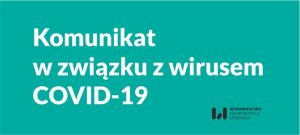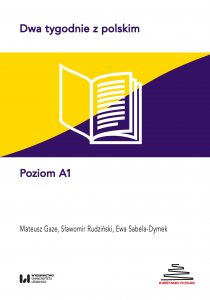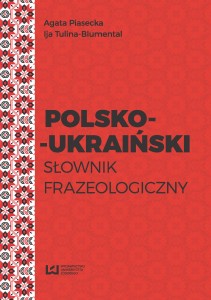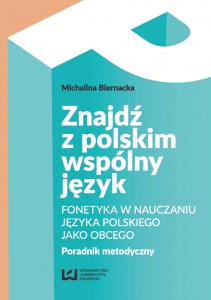Przegląd Socjologii Jakościowej | Tom 20 Nr 1 (2024)
Opublikowano: 19 marca 2024
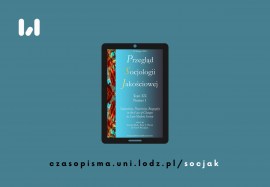
Przegląd Socjologii Jakościowej jest kwartalnikiem Wydawnictwa Uniwersytetu Łódzkiego, który kontynuuje refleksję nad jakościową i interpretatywną drogą uprawiania socjologii. Redakcja dąży do współpracy, integracji i rozwoju środowiska naukowego, a swoją inicjatywę podejmuje w imię wartości takich jak: indywidualność, równość, tolerancja, społeczność, nauka, ludzkość.
W numerze (PDF):
Numer tematyczny „Subjectivity, Projectivity, Biography in the Face of Changes in Late-Modern Society” edited by Kamila Biały, Piotr F. Piasek & Paweł Pieniążek
The Shaping of Subjectivity and Biographies of Individuals in the Face of the Transformations of a Neo-Modern Society: An Introduction
Kamila Biały, Piotr F. Piasek, Paweł Pieniążek
The presented text is an introduction to other articles included in this issue, which were prepared for the purpose of publishing the methodological and the historical-theoretical parts of the results of the research grant. Our study aimed to examine contemporary changes in subjectivity as well as explore how the subjectivity of our interlocutors emerges during narrative interviews. The first part of the article outlines the premises for the conducted research. The subsequent section presents a short argument discussing the category of “projectivity” in the context of changes in a (post-)modern society. Finally, we briefly refer to methodological issues, which are described in much greater detail in other texts presented in the issue.
On Social Emergence: A Non-Dichotomous Approach to Qualitative Data Analysis
Kamila Biały, Piotr F. Piasek
As part of our research project titled The Shaping of Subjectivity and Biographies of Individuals in the Face of the Transformations of a Neo-modern Society, data was collected with a tool of narrative interviewing focusing on the present experience. In this article, we propose a nondichotomous way of analyzing this qualitative material. The inspiration for creating the presented analytics is the epistemological position of the Gestalt psychotherapy as well as phenomenology (Merleau-Ponty and Waldenfels). The narrative interviews were aimed at theorizing (about) subjectivity in the biographies of contemporary Poles, but the analysis focuses not so much on depicting subjectivity as ‘basic agency’ – i.e. that which provides the possibility of action, interaction, self-narrating – but, rather, on seeing subjectivity as a component that emerges only in the long process of narration and interaction.
On Social Emergence: A Non-Dichotomous Approach to Qualitative Tool Design
Kamila Biały, Piotr F. Piasek
The narrative biographical interview is a research tool that has been successfully used to study the reproductions of the overall constellations of social life that occur within an individual life. The entire methodological proposal as well as the issue of reproduction are based on a dichotomous epistemology. In the presented article, we analyse this issue of reproduction as it appears in Fritz Schütze’s work. Next, we describe a proposal for an alternative narrative interview – interview about the present based on a non-dichotomous epistemology. In our opinion, this epistemological perspective addresses the issue of reproduction in a completely different way. And, more importantly it introduces in the field of sociology an issue of emergence. To illustrate this non-dichotomous logics, we are using the material from one of the interviews from the research data collection.
Late Modern Projectivity and Existentialism
Paweł Pieniążek
The article addresses the issue of the relationship between existentialism and late modern projectivity interpreted in terms of project work and of biographical projectivity. It does so from the perspective of transformations of subjectivity in modernity and late modernity, and, therefore, from the perspective of the process of individualization. The objective is to answer the question of the belonging of existentialism to one of these sociocultural formations. For these purposes, some major categories of existentialism such as project, anxiety, and temporality are analyzed. Their analysis leads to the conclusion that there is a close, structural correlation between existentialism and sociocultural structures of modernity as well as that existentialism, in contrast to late modern projectivity, has some emancipatory potential related to its alienating status in modernity. The article refers to the methodology of qualitative sociology.
Late Modern Individualization in Light of Critical Theory (the Frankfurt School): An Essay
Paweł Pieniążek
The article describes the dialectic of the process of individualization in modernity and late modernity from the perspective of critical theory, particularly in its classical form (Frankfurt School). This dialectic consists in the transformation of individualization as a medium of emancipation into individualization understood not only as an ideology but most of all as a productive force of neoliberal capitalism, as a principle of its functioning. The article discusses the social-cultural determinants of this transformation, and subsequently the way in which late-modern individualism in the form of self-realization is functionalized by the market and subjected to the requirements of profit and efficiency in individual areas of economic and social life in the neoliberal world. The article refers to the methodology of qualitative sociology.
Numer regularny
Autonomiczna czy kontrolowana? O motywacji pracowników platformowych w systemie pracy na żądanie w Polsce
Dominika Polkowska
Praca za pośrednictwem platform na żądanie obok cech pozytywnych, do których zaliczają się np. elastyczność czasu pracy czy łatwość wejścia i wyjścia, wykazuje również cechy negatywne: wysoki poziom niepewności zatrudnienia, niskie i niepewne zarobki czy wpływ algorytmów, których zasad funkcjonowania nie znamy. Mimo tego coraz więcej osób podejmuje takie zajęcie. Wykorzystując teorię autodeterminacji Deciego i Ryana, artykuł odpowiada na pytanie, jakie rodzaje motywacji – motywacja autonomiczna czy kontrolowana – wyjaśniają podejmowanie pracy platformowej typu offline. Badania przeprowadzone wśród kurierów i kierowców pracujących za pośrednictwem aplikacji w Polsce pokazują, że w tym przypadku mamy do czynienia z obydwoma rodzajami motywacji. Jednak motywacja autonomiczna przeważa nad kontrolowaną, czego przejawem jest zaspokajanie potrzeb autonomii, kompetencji oraz więzi z innymi poprzez wykonywanie pracy platformowej.
Strategie (de)legitymizacyjne kandydatów w wyborach na prezydenta Rzeszowa w 2021 roku. Analiza korpusowa wpisów na Twitterze
Marcin Kosman
W artykule zrekonstruowano oraz poddano analizie dyskursy kandydatów ubiegających się o stanowisko prezydenta Rzeszowa w 2021 roku. Materiałem badawczym były wpisy na kontach na Twitterze (obecnie serwis funkcjonuje pod nazwą X) Konrada Fijołka, Marcina Warchoła, Ewy Leniart i Grzegorza Brauna w okresie kampanii wyborczej. W celu precyzyjnego zobrazowania dyskursów polityków w opracowaniu posłużono się metodami lingwistyki korpusowej, które umożliwiają przeprowadzenie analizy na poziomie ilościowym. Wykazano, iż kandydaci skupili się przede wszystkim na pozytywnej autoprezentacji oraz podkreślaniu swoich związków z miastem. Można jednak dostrzec pewne cechy charakterystyczne dyskursów poszczególnych polityków: Marcin Warchoł dokonywał autoprezentacji jako polityk popierany przez mieszkańców miasta i prezydenta Tadeusza Ferenca, Konrad Fijołek podkreślał wsparcie elit politycznych i medialnych, natomiast dyskurs Grzegorza Brauna w największym stopniu odróżniał się od pozostałych kandydatów (jako najbardziej radykalny). W artykule pokazano, w jaki sposób metody lingwistyki korpusowej mogą stanowić uzupełnienie badań dyskursu medialnego czy politycznego.
Torty z piasku, parafinowe kremy i owoce z plastiku – czyli futuryzm w dyskursie polskiej prasy kobiecej z lat 1970–1979
Anna Węgiel
Celem artykułu jest zaprezentowanie futuryzmu jako ideologii kryjącej się w dyskursie porad żywieniowych publikowanych na łamach polskiej prasy kobiecej w latach siedemdziesiątych dwudziestego wieku. Futuryzm jest jedną z cech ideologii tzw. wysokiego modernizmu, a jego najbardziej charakterystyczne przejawy to: umiłowanie przyszłości wraz ze snuciem utopijnych wizji o jej kształcie, chęć podboju technologicznego świata natury, a także historycyzm – wiara w liniowy rozwój ludzkości, który zmierza do „nowoczesności”. Badanie empiryczne polegało na odnalezieniu cech futuryzmu w tekstach porad żywieniowych z dwóch najpopularniejszych polskich czasopism lat siedemdziesiątych: „Przyjaciółki” oraz „Kobiety i Życia”. Wybraną metodą była zorientowana socjologicznie analiza dyskursu. Analiza zgromadzonego materiału pozwala twierdzić, że futuryzm był istotnym czynnikiem ideologicznym kształtującym porady żywieniowe publikowane na łamach prasy w PRL w tym okresie. Obserwacja ta rzuca nowe światło na kulturę kulinarną PRL i otwiera nowe możliwości interpretacyjne.
Recenzja książki. Maciej Frąckowiak (2022), Obrazy, co mogą. Studium przeobrażania świata przez fotografię, Kraków: Wydawnictwo Universitas
Kalina Kukiełko
Komentarze
Ten post dostępny jest także w języku: angielski


